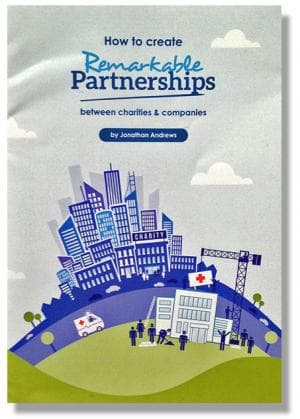New research shows how charities can create remarkable corporate partnerships
- Written by
- Remarkable Partnerships
- Added
- May 23, 2014
A new report from Jonathan Andrews has found that when charities and companies partner in a remarkable way they deliver huge impact, have wider reach, create more opportunities and last longer. Read a summary here and to download a free copy go to www.remarkablepartnerships.com.
The definition of a remarkable partnership is when a company and a charity partner in an extraordinary way.
The report is a result of detailed qualitative interviews with 14 people who work in corporate partnership roles with charities and corporate social responsibility roles with companies.
Jonathan Andrews, director of corporate partnerships consultancy Remarkable Partnerships, explains why he conducted the interviews.
‘I undertook this research for two reasons. Firstly, there are some stunning examples of charities and companies partnering together in a remarkable way and I wanted to celebrate the huge impact they are making together. Secondly, I know that some charities and companies partner in a very average way, or not at all, and I believe that remarkable partnerships can provide them with inspiration, because they show them how to achieve extraordinary results.’

The report looks at different examples of remarkable partnerships, such as the relationship between Macmillan Cancer Support and Boots UK. This partnership is remarkable because they are delivering a service together. Boots pharmacists train to be ‘Boots Macmillan information pharmacists’ and offer information and support about cancer in their high street stores. This role recognises that not everyone wants to visit a hospital and it enables Macmillan to communicate with people they might not otherwise reach and connect them to local support services in their community. The role was launched a year ago and 1,750 pharmacists have already chosen to take part, even though it’s entirely voluntary and they undertake the professional development in their own time.

Another inspiring example is Innocent’s partnership with Age UK, where woolly hats appear on top of smoothie bottles in supermarkets. For every bottle sold Innocent donate 25p to help keep older people warm in winter. This partnership is remarkable because it jumps off the shelf and grabs our attention, inspiring us to purchase, smile and care. It looks and feels so different that the media pays more attention and people talk about it ensuring the message spreads and reaches a much wider audience.
This partnership is also extraordinary because the beneficiaries (older people) are also the people who knit the hats. So they’re really helping themselves. This year Innocent and Age UK are aiming to knit one million hats to go on top of smoothie bottles, which will raise a staggering £250,000 to support vulnerable older people.
The report identifies seven ways to create remarkable partnerships.
- Gain inspiration from other partnerships.
- Understand your audience.
- Focus on prospects where there is a good fit.
- Take calculated risks.
- Inspire your prospects.
- Involve the whole organisation.
- Create them together.
It also shares seven ways to sustain remarkable partnerships.
- Involve senior people.
- Have a goal that’s more than just money.
- It takes hard work.
- Look for ways to evolve the partnership.
- Demonstrate success.
- Have an open and honest relationship.
- Manage your partnership in a professional way
The report concludes that remarkable partnerships take more effort, insight, inspiration, bravery and collaboration, but the extraordinary results they deliver make them worthwhile.


















